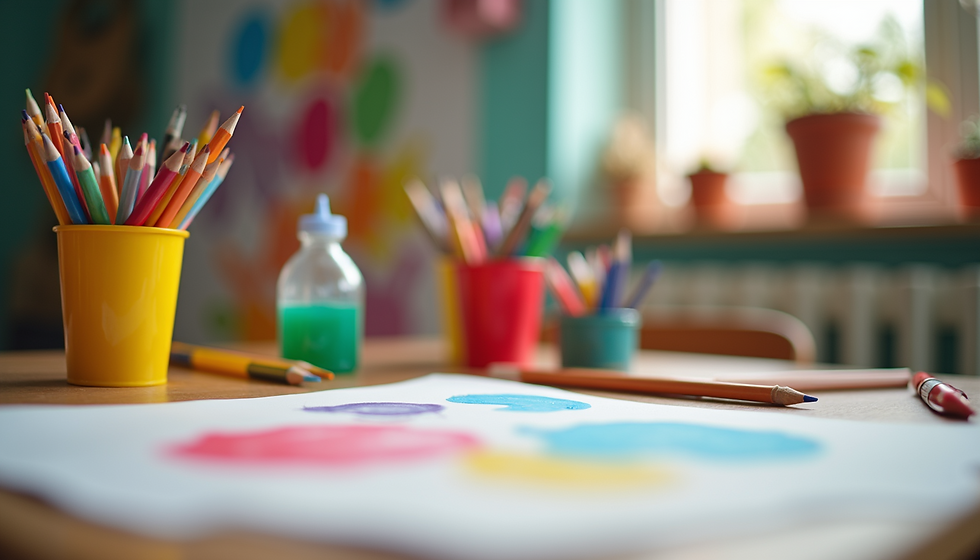The Benefits of Preschool Education for Early Childhood Development
- Laylee Bodaghee

- Jun 19
- 4 min read
Preschool education is a crucial stepping stone in a child's early learning journey. As children move from the comfort of their homes to a structured preschool setting, they embark on a path that introduces them to social interactions, creative expression, and foundational learning. In this post, we explore the many benefits of preschool education and how it significantly impacts early childhood development.
Building Social Skills
One of the key advantages of preschool education is the chance for children to develop essential social skills. In a preschool setting, children interact with their peers, learning to share, take turns, and communicate. These early interactions lay the groundwork for strong future relationships.
For instance, children often participate in group activities, such as collaborative art projects or simple group games. During these activities, they not only make friends but also learn to resolve conflicts. Research shows that children who develop strong social skills in preschool can have a 30% larger network of friendships by the time they reach elementary school. Such skills foster teamwork and cooperation, which benefit them in later life.
Enhancing Cognitive Development
Preschool programs are designed to spark curiosity and boost cognitive development. Through structured play, storytelling, and various educational activities, children encounter new concepts and ideas. This rich environment promotes critical thinking, problem-solving skills, and language development.
Activities such as puzzles, art projects, and interactive games stimulate cognitive growth. For example, children working with building blocks develop spatial awareness, while those engaged in storytelling enhance their vocabulary. Studies indicate that preschoolers who participate in such activities show a 20% improvement in early literacy skills compared to those who do not.
Fostering Independence
Preschool education encourages children to become more independent. In this safe setting, they engage in self-directed activities that require them to make choices and take responsibility. This newfound independence helps build confidence and empowers them to explore new things.
Learning to manage their belongings, complete tasks, and make choices fosters self-reliance. For example, children learn to tie their shoes or pack their lunch, which cultivates their sense of autonomy. This confidence is beneficial not just in school but throughout life, as independent individuals are often more successful in personal and professional settings.

Promoting Emotional Development
Emotional development is another meaningful benefit of preschool education. Through interactions with peers and educators, children learn to identify and express their feelings in healthy ways. This emotional literacy is vital for personal growth and future relationships.
Programs often incorporate social-emotional learning activities that teach kids to recognize their emotions and that of others. For example, role-playing games can illustrate empathy, a skill crucial for building meaningful relationships. Research indicates that children who receive social-emotional education in preschool are 40% more likely to exhibit positive behavior in school settings.
Encouraging Creativity and Imagination
A key aspect of preschool education is encouraging creativity and imagination. Through arts and crafts, dramatic play, and exploratory activities, children have the freedom to express themselves creatively. This creative outlet is essential for cognitive flexibility and problem-solving skills.
Imaginative play, such as pretending to be a doctor or an astronaut, allows children to explore different roles. This exploration fosters innovation and can lead to greater success later in life. Experts note that children engaged in creative activities exhibit higher levels of problem-solving abilities, often up to 35% better than their peers who do less creative play.
Establishing a Strong Educational Foundation
Preschool serves as an introduction to formal education, providing children with a solid foundation for future learning. Through structured routines and educational activities, children become acquainted with school expectations and routines.
Typically, preschoolers engage in early literacy and numeracy activities, preparing them for the academic demands of kindergarten. Evidence suggests that children who attend preschool are 50% less likely to experience anxiety about starting school, allowing for smoother transitions and increased readiness for academic challenges.
Improving Long-term Outcomes
Research indicates that children who attend preschool experience significantly better long-term outcomes. Quality preschool programs can enhance academic performance, increase graduation rates, and improve social skills throughout life.
For example, a study found that children who attended a quality preschool are 25% more likely to graduate high school than those who did not. Additionally, these early experiences often lead to better lifelong learning habits, ultimately benefiting both the individual and society.
The Importance of Early Childhood Education
Preschool education plays a vital role in nurturing well-rounded individuals. The benefits extend far beyond the classroom, influencing social, emotional, and cognitive growth. By providing children with essential skills and knowledge, preschool sets the stage for a successful educational journey.
In addition to laying a strong foundation for learning, preschool allows children to explore creativity, develop independence, and build lasting friendships. As society increasingly recognizes the value of early childhood education, investing in quality preschool programs becomes essential for ensuring a bright future for our youngest learners.
Preschool is more than just a place for children to learn; it is a dynamic environment where they can thrive and fully unleash their potential. Embracing the benefits of preschool education is a vital step toward nurturing capable, confident individuals.


Comments